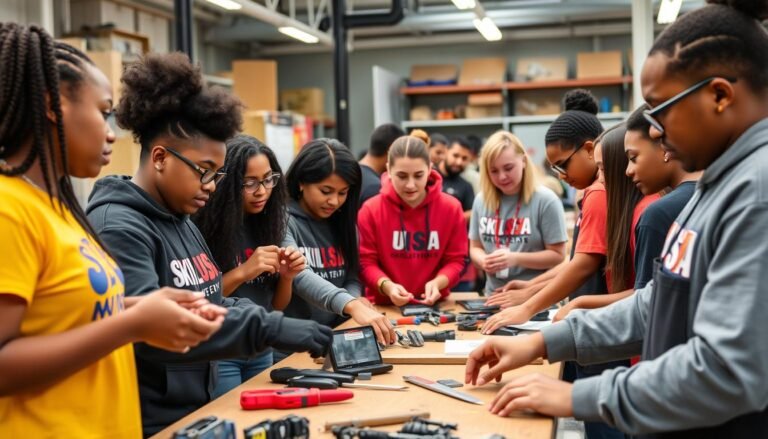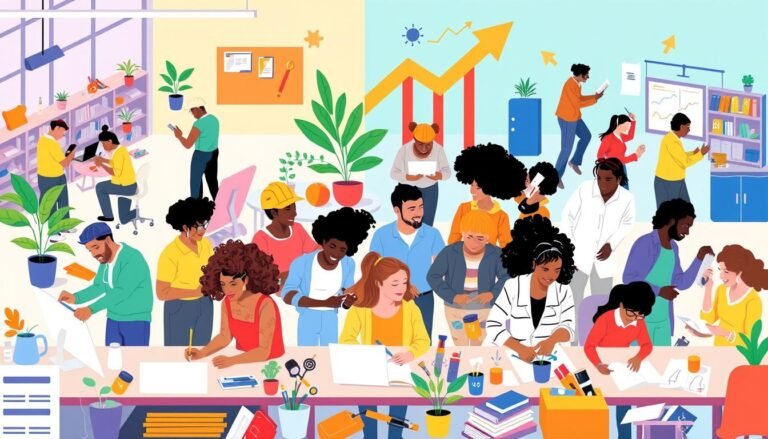Skills Development Facilitator: Empowering Growth
Ever wondered how companies keep up with today’s fast-changing business world? It’s not just about hiring new people or using the latest tech. Many companies are using a secret tool: the skills development facilitator.
These unsung heroes are changing how companies grow their employees. They create a culture where learning never stops. This helps companies stay ahead and lets employees reach their best potential.
In today’s fast-changing job market, skills development facilitators are key. They check how skilled the workforce is, find skill gaps, and offer training to fill them. They make sure company goals match what employees want, benefiting both sides.
Skills development facilitators have a big impact. Companies that use them see a 20% increase in keeping employees and a 15% boost in work output. These numbers show how important strategic skills development is today.
Key Takeaways
- Skills development facilitators drive organizational growth and employee retention
- They conduct skill assessments and implement targeted training programs
- Companies with SDFs see increased productivity and reduced skill gaps
- SDFs foster a culture of continuous learning and adaptability
- Investing in skills development leads to higher employee satisfaction and engagement
Understanding the Role of a Skills Development Facilitator
Skills development facilitators are key in making workers better and managing talent. They help companies grow by running training programs and planning for the future.
Defining Skills Development Facilitation
These facilitators help workers and companies get better at what they do. They look at what training is needed, make training plans, and check how well learning is going.
Key Responsibilities and Functions
Skills development facilitators do many important tasks. They:
- Design and run training programs
- Help and guide employees
- Make sure training follows the law
- Work with others on managing talent
- Handle paperwork for training
Impact on Organizational Growth
Facilitators play a big part in making companies do well. They fill skill gaps, create a culture that values learning, and make employees more competitive. This is crucial for companies to keep up with new technology and market changes.
| Metric | Value |
|---|---|
| Median Annual Wage (2017) | $60,360 |
| Expected Job Growth (2016-2026) | 11% |
| Typical Work Hours | 40+ per week |
With more focus on learning and growing, skills development facilitators are key to shaping the future workforce. They help drive success in companies.
The Importance of Skills Development in Today’s Workforce
Our job market is changing fast, making skills development key. The World Economic Forum says automation will affect 85 million jobs by 2025. This shows we need to keep learning and improving our skills.
Adapting to Rapid Technological Changes
Technology is moving too fast. Companies need to offer skill-building workshops to keep up. A LinkedIn report found 91% of workers value soft skills over technical ones. This shows we need training that covers both areas.
Bridging Skill Gaps in Organizations
Many companies face skill gaps. A study in 43 countries found 50% of employers can’t find the skills they need. In the U.S., 83% of companies say they have a skills gap. Using career advancement initiatives can help fix these issues.
Enhancing Employee Competitiveness
Investing in employee growth has big rewards. Research shows 84% of top performers get the training they need. This not only makes companies more competitive but also keeps employees happy, with over 90% more likely to stay with their employer.
| Aspect | Impact |
|---|---|
| Productivity | 12.5% increase when teams focus on strengths daily |
| Engagement | 76% higher in high-trust environments |
| Stress Reduction | 74% report feeling less stressed in high-trust environments |
By focusing on skills development, companies can build a workforce that’s adaptable, competitive, and happy. This prepares them for the future.
Core Competencies of an Effective Skills Development Facilitator
Skills development facilitators are key to helping people and teams grow in their careers and leadership skills. They have a special mix of skills that help teams perform better and reach their goals.
These facilitators are great at working with people, thinking critically, and leading others. They know how to teach, are skilled in their field, and understand different cultures. They can adjust to many situations and keep learning throughout their careers.
| Key Competency | Description |
|---|---|
| Communication | Clear and effective communication to engage learners |
| Conflict Resolution | Ability to handle disagreements and promote harmony |
| Creativity Elicitation | Skill to evoke innovative thinking in groups |
| Strategic Planning | Capacity to guide long-term organizational development |
| Action Planning | Proficiency in translating ideas into actionable steps |
Great facilitators make sure everyone gets involved and thinks creatively. They make sure events are well-run, lead to good results, and help learners ask and discuss important questions. They focus on making training better, not just sharing their own knowledge.
“Effective facilitators ensure clear learning objectives and defined agenda items, maximizing investments for both learners and organizations.”
In today’s diverse workforces, facilitators have to deal with tight schedules and different ways of learning. They must make sure everyone feels included and encourages open discussion. By using these skills, facilitators help people and teams grow and succeed.
Strategies for Implementing Successful Skills Development Programs
Effective talent management needs a solid plan for skills development. Let’s look at key strategies for impactful programs. These programs help build a culture of continuous learning.
Conducting Comprehensive Needs Assessments
A detailed skills audit is key. Use surveys, interviews, and focus groups to spot gaps. The Leadership Architect tool by Korn Ferry helps focus on future skills for leaders. This step is longer than the training itself but is crucial.
Designing Tailored Learning Pathways
Make training programs that fit individual and team needs. Think about different learning ways like online, offline, and both. Use design principles like relevance and engagement. Offer various media formats for different learning styles.
Leveraging Technology in Skills Development
Use e-learning platforms and digital tools to improve training. In our VUCA world, technology helps us adapt to fast changes. Adjust learning plans with feedback and data. These strategies will help you create effective skill-building workshops and empower your team.
Source Links
- Skills Development Facilitator Services | Build Stronger Teams
- Skills Development Facilitator: Empowering Career Growth
- QCTO Skills Programme: Skills Development Facilitator
- Job Description of a Skills Development Facilitator
- Understanding the role of a Skills Development Facilitator
- What is Skills Development in The Workplace? – Business Optimization Training Institute
- Skill Development for Teams | WorkRamp
- ToP Facilitation Competencies – ICA International
- 11 Roles of a Facilitator and Skills You Need to Be One | Acorn PLMS
- What are some best practices for implementing an organizational skills development plan?
- What are facilitation skills and how to improve them? | SessionLab







